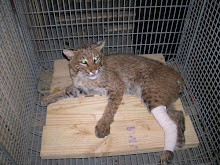I try not to focus too much on the animals that die. Learn from your mistakes, realize that you can not save everything and be humble. I learned this the hard way with a bunch of merganser ducklings last spring. I thought I could save any animal brought to me ... they are really tough ducks to keep alive. All Wildlife Rehabbers that have ever had a box of the adorable little time bombs brought to them knows exactly what I am writing about.
I have 2 robins coming in tonight after school. I found (caught would be a better description since the bird was probably completely fine on the ground, being fed by parents after flying out of the nest) a baby robin when I was around 8 yrs old. I kept it alive (illegally, I didn't know any NYS/Federal laws) ... and then my cat ate it upon release.
I like our cats, you probably like yours. Do you know that they are the biggest predator to wildlife there is? Feral cats kill more songbirds every year than anything else. Please supervise your cats time outdoors or keep them indoors. This time of year is when the baby birds are fledgling, leaving the nest and are very vulnerable on the ground. If your cat brings one home or is playing with one in the yard. Take the cat indoors, check over the bird for serious injuries, leave alone in a safe spot out of the sun and observe to see (once things calm down) if the parents continue feeding it.
I didn't have much time to help Chris on the Raptor Center last night. I received a phone call on a Turkey Vulture near Delhi, NY that was found in a hedge row in bad shape. Its wings do not appear broken but it looks like both legs are: possibly shot. Lots of maggots. By the time we got him transported, splinted and stabilized it was pushing midnight.
The vet will determine the fate of this bird. It is often more humane to put a raptor (hawk, owl falcon) to sleep than it is to keep it alive with a very serious disability. A lot of people target vultures because they are "ugly". I was watching 27 vultures the other evening soar around the Schoharie Valley. They were not even flapping their wings, they were just riding the wind thermals for hours ... very cool and FEDERALLY protected by law I might add.
I am sure that something else besides the robins will come in tonight, I will let you know tomorrow.
The little coon is doing better. She doesn't nurse like the other kits I have had for weeks. She rolls around, plays with my hand with her back feet and often nurses on her back. She is a noisy little character which still amazes me that she survived. She isn't out of the woods yet; if she survives she will find herself back in there one day.
I also want to remind everyone that feeds the Hummingbirds that they need to change their feed often. Every 3 days at the most on hot days the nectar solution needs to be changed. Old solution will make them sick. If you are lucky like us and get so many Hummingbirds that they empty your feeders every 1-2 days, it makes keeping it fresh easy.
If you wish to make your own hummingbird food, follow the instructions of the National Audubon Society and be sure to boil well to destroy bacteria, then cool the solution before feeding:
http://www.audubon.org/bird/at_home/bird_feeding/hum_feeders.html
Fill the feeders with sugar water, made by combining four parts hot water to one part white sugar, boiled for one to two minutes. NEVER use honey, which promotes the growth of harmful bacteria, or artificial sweeteners. Also avoid red food coloring.
Till tomorrow,
Wes







No comments:
Post a Comment